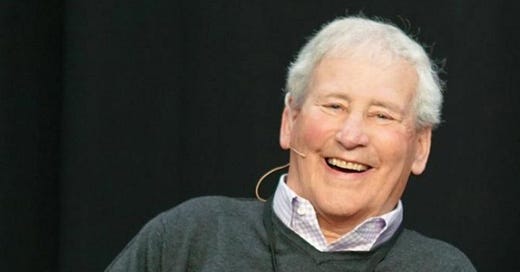7 Lessons For Getting The Most Out Of Your Product Team
Bill Campbell played an instrumental role in the growth of several prominent companies, such as Google, Apple, and Intuit, and some of the simple coaching lessons learned from him can stand you in good stead for getting the most out of your product team.
One of the books I read during the Covid lockdown was Trillion Dollar Coach, written by some of the founding team at Google, and focusing on the lessons they'd learned from of the world's most famous and successful business coaches: Bill Campbell.
Campbell played an instrumental role in the growth of several prominent companies, such as Google, Apple, and Intuit, and as I was reading I picked out some of the simple coaching lessons learned from him that can stand you in good stead for getting the most out of your product team.
1) To build rapport and better relationships among team members, start team meetings with more personal, non-business topics.
I think this is fairly straightforward and applicable in all walks of life. building relationships with people is more than functional tasks, it's about understanding and empathy.
To understand another person's view and be empathetic towards them, starts by learning more about them as a person.
Your team members are not engineers, designers, or scrum masters first, they are people first and their jobs are just roles they play. Understand the person to get the most out of your team.
2) Build trust first
Following on from the building rapport lesson, success will more easily come if you can build trust within your team.
Teams that trust each other will continue to have disagreements (in the same way that families do), but when they do, they tend to be accompanied by less emotional strain.
Ultimately, if you trust your team, and they disagree with you, you know that this comes from a good place, with no ulterior motives, so make sure you develop trust and people can feel free to share their thoughts and opinions in order to drive your product forward.
This lesson seems to be backed up by a Cornell University study on task conflict.
3) Define the 'first principles' for a situation, which illustrate the immutable truths that are the foundation for the product
What does your product stand for? What is its essential purpose?
Once you know that and everyone is bought into this vision, then decisions on how your product will proceed should be based on those principles.
This is very similar to Simon Sinek's vision of "start with why', where you seek to understand why we do what we do in order to inspire others.
In both cases, the fundamental principle shapes future action by focusing on decision making.
4) When faced with a problem, or opportunity, the first step is to ensure the right team is in place and working on it
There's a reason why in scrum teams you have a product owner, scrum master, testers, designers, UX specialists, and ops engineers in addition to developers. Each person has complementary skills and abilities, which combined bring the range of knowledge needed to capitalize on the opportunities of product development.
This same principle applies to all sorts of product-related teams.
If you need to brainstorm a particular feature area, then ensuring you have a range of voices from across different areas is essential to give you the best chance of success.
5) Winning depends on having the best team, and the best teams have more women.
Bill Campbell came from a sports coaching background, so it's no surprise when his lessons use terminology that is associated with sports, in this case, 'winning'.
However, what we're talking about here is a success, and success does come to the best teams, and the best teams in the workplace invariably have more women on them.
This has 100% been the case in every role I've ever held.
It comes down to widening the skill sets and perspectives, whilst neutralizing some of the toxic masculinity that can occur when too many men gather together.
Always look to get more women involved in your teams if you want your product to fly.
6) The manager's job is to run a decision-making process that ensures all perspectives get heard and considered, and, if necessary, to break ties and make the decisions.
Many believe that managers are the decision makers and what they say goes, and there are plenty of organizations that operate in that way. However, Campbell and I agree that the really successful teams are ones where the manager is facilitating team action and decision-making, whilst only stepping in to steer the team when they veer off course or give them a shove when they come aground.
If the manager is making all the decisions then what is the team actually there for?
7) Believe in people more than they believe in themselves, and push them to be more courageous.
Finally, and in my opinion, the most important lesson learned from Bill Campbell, is that you need to believe in others more than they do so that you can inspire them to achieve new heights, and with it take you, your team, and your product with them.
If teams work within themselves because they worry about potential results, your product will not grow to its potential.
Managers can help others see a different future, and the belief that a manager can convey will lift the team to a different level.




